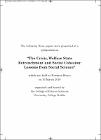Browsing Economic and Social Review Archive: Complete Collection 1969- by Author "Callan, Tim"
Now showing items 1-11 of 11
-
Distributional aspects of Ireland's fiscal adjustment
Callan, Tim; Nolan, Brian (Economic & Social StudiesDublin, 1992)Conflicting claims about the distributional impact of Ireland's fiscal adjustment have been made. This paper clarifies the different implicit standards on which these may be based, and uses the limited available data on ... -
Female labour supply in farm households: farm and off-farm participation
Callan, Tim; Van Soest, Arthur (Economic & Social StudiesDublin, 1993)Many Irish women in farm households have an input into the running of the farm; while a much smaller proportion are engaged in off-farm employment. Using cross-section household data, we analyse various models in which ... -
Inequality and the crisis: the distributional impact of tax increases and welfare and public sector pay cuts
Callan, Tim; Nolan, Brian; Keane, Claire; Walsh, John R. (Economic & Social StudiesDublin, 2010)The economic crisis impacts directly on the distribution of income via unemployment and private sector wages, but the way policy responds in seeking to control soaring fiscal deficits is also central to its distributional ... -
Male-female wage differentials in Ireland
Callan, Tim (Economic & Social StudiesDublin, 1991)The persistence of sizeable male-female earnings differentials despite the introduction of a range of anti-discrimination measures has been a focus of concern in many countries. In Ireland the ratio of female to male wage ... -
Measuring poverty in Ireland: reply
Callan, Tim; Hannan, Damian F.; Nolan, Brian; Whelan, Brendan J. (Economic & Social StudiesDublin, 1990)MacCarthaigh makes three points with respect to the measurement of poverty, drawing on the work of Stein Ringen. We deal with these in turn, and attempt to match his comment for succinctness ? the issues are discussed in ... -
Non-cash benefits and the distribution of economic welfare
Callan, Tim; Keane, Claire (Economic & Social StudiesDublin, 2009)Non-cash benefits can have substantial effects on the distribution of economic welfare. Standard approaches to the inclusion of non-cash benefits in broader measures of resources have failed to take adequate account of the ... -
Price determination in Ireland - effects of changes in exchange-rates and exchange-rate regimes
Callan, Tim; Fitzgerald, John (Economic & Social StudiesDublin, 1989)This paper finds that the wholesale price of Irish manufacturing output is closely tied to foreign prices in the long run; domestic wage costs generally do not exert a significant influence. In the short run changes in ... -
Unemployment, welfare benefits and the financial incentive to work
Layte, Richard; Callan, Tim (Economic & Social StudiesDublin, 2001)Although disincentive effects associated with payments have been regulaly found in research in the US and UK, the UK research is disputed and effects have been notable by their absence in studies from Continental Europe. ... -
Unions and the wage distribution in Ireland
Callan, Tim; Reilly, Barry (Economic & Social StudiesDublin, 1993)This paper examines the effects of trade unions in Ireland on the first two moments of the wage distribution. Using data from the ESRI's 1987 Survey of Income Distribution, Poverty and Usage of State Services, a union ... -
What has happened to replacement rates?
Callan, Tim; Nolan, Brian; O'Donoghue, Cathal (Economic & Social StudiesDublin, 1996)This paper compares different approaches to measuring changes in replacement rates in Ireland over time. Results based on microsimulation modelling suggest that the average replacement rate facing unemployed persons was ... -
What role for property taxes in Ireland?
Callan, Tim; Keane, Claire; Walsh, John R. (Economic & Social StudiesDublin, 2010)What role could a property tax play in broadening the Irish tax base? An annual tax on property has been recommended in a series of reports over the past 25 years, from the first Commission on Taxation (1985), to the recent ...














